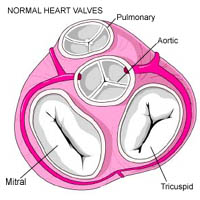Aortic Valve Repair / Replacement Surgery
 The valves of the
heart can become diseased and malfunction. Some valves become narrowed, or
stenosed, and block the flow of the blood through them. Others can become
leaky or regurgitant - allowing blood to flow backwards through them after
the heart pumps it out into the body. During heart valve surgery, one or
more heart valves can be repaired or replaced. Repair means that the valve
is tailored to help it work better. Replacement means your own diseased
valve is removed and a new valve is inserted in its place. The decision
whether to repair or replace a valve often can't be made until after surgery
has begun. You and your surgeon can discuss plans for surgery and any other
procedures you may need.
The valves of the
heart can become diseased and malfunction. Some valves become narrowed, or
stenosed, and block the flow of the blood through them. Others can become
leaky or regurgitant - allowing blood to flow backwards through them after
the heart pumps it out into the body. During heart valve surgery, one or
more heart valves can be repaired or replaced. Repair means that the valve
is tailored to help it work better. Replacement means your own diseased
valve is removed and a new valve is inserted in its place. The decision
whether to repair or replace a valve often can't be made until after surgery
has begun. You and your surgeon can discuss plans for surgery and any other
procedures you may need.
Repairing
a Valve
During valve
repair, parts of a stenotic valve that are stiff or hardened may be cut and
separated to help them open wider. Parts of an insufficient valve may be
strengthened and shortened to help the valve close more tightly.
Replacing
the Valve
If a valve can't
be repaired, it may be replaced with a prosthetic valve. Two kinds of
prosthetic heart valves are available:![]()
- Mechanical valves are created from manmade materials. Lifetime therapy
with anticoagulant medication, to prevent blood clots on or around the
valve, is necessary when these types of valves are used.
- Biological (tissue) valves are taken from pig, cow, or human donors. Biological valves don't last as long as mechanical valves. However, when biological valves are used, long-term therapy with anticoagulant medication often isn't necessary.
You and your doctor can discuss which type of valve is best for you. Factors considered are your age, your occupation, the size of your valve, how well your heart is working, your heart's rhythm, your ability to take anticoagulant medications, and how many new valves you need.
Life After
Valve Surgery
Valve surgery
may give your heart the boost it needs so you feel better. Feeling better
can let you get back to doing the things you enjoy. After your surgery, take
care of yourself and your heart to keep your new valve working right. For
many people, this includes taking medications called anticoagulants every
day. Your doctor will talk to you about these medications and other things
you can do to help keep your heart valves healthy in the future
- Understanding your Aortic Valve Replacement Surgery
- Why Should I Have An Aortic Valve Replacement?
- Mechanical Versus Tissue Aortic Valves
- Before Your Aortic Valve Replacement Surgery
- Getting Started
- Moving to the Operating Room
- Anesthesia for Aortic Valve Repair / Replacement Surgery
- What Happens During The Aortic Valve Replacement?
- Moving to the Intensive Care Unit
- Time in the Hospital After Your Aortic Valve Repair / Replacement Surgery
- Leaving the Hospital After Aortic Valve Repair / Replacement Surgery
- What Results Can You Expect From Aortic Valve Surgery?
- How Safe is Aortic Valve Replacement?
- Risks and Complications of Aortic Valve Surgery
- Minor Aortic Valve Replacement Complications
- Other Complications for Aortic Valve Replacement
- Major Aortic Valve Replacement Complications
- Infection – Aortic Valve Replacement Risks
- Bleeding and Transfusions – Aortic Valve Replacement Risks
- Heart Attack– Aortic Valve Replacement Risks
- Stroke– Aortic Valve Replacement Risks
- Kidney Problems– Aortic Valve Replacement Risks
- Allergic Reaction to Medication – Aortic Valve Replacement Risks
- Abnormal Scarring – Aortic Valve Replacement Risks
- Irregular Heartbeat – Aortic Valve Replacement Risks
- Valve Failure – Aortic Valve Replacement Risks
- Valve Infection – Aortic Valve Replacement Risks
- Wound Breakdown – Aortic Valve Replacement Risks
- Risks as a Diabetic During and After Aortic Valve Replacement
- Final Thoughts on Aortic Valve Replacement Complications